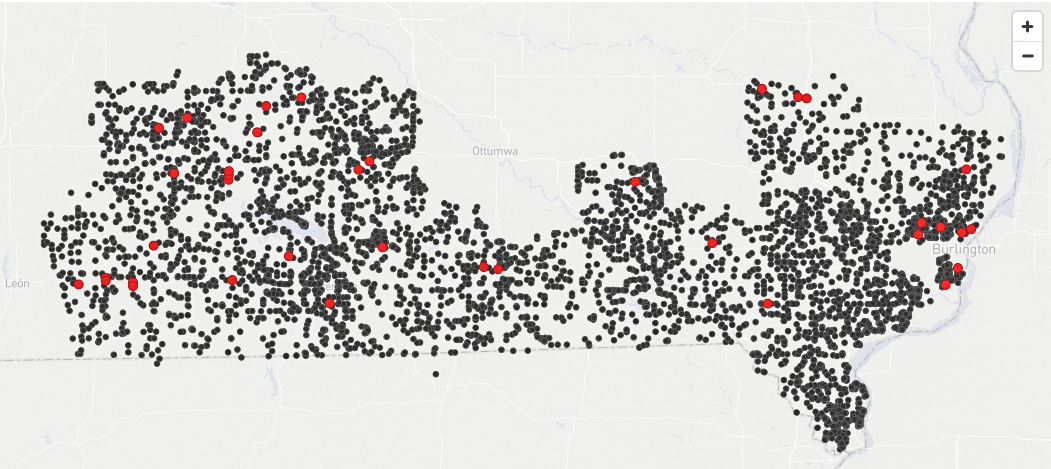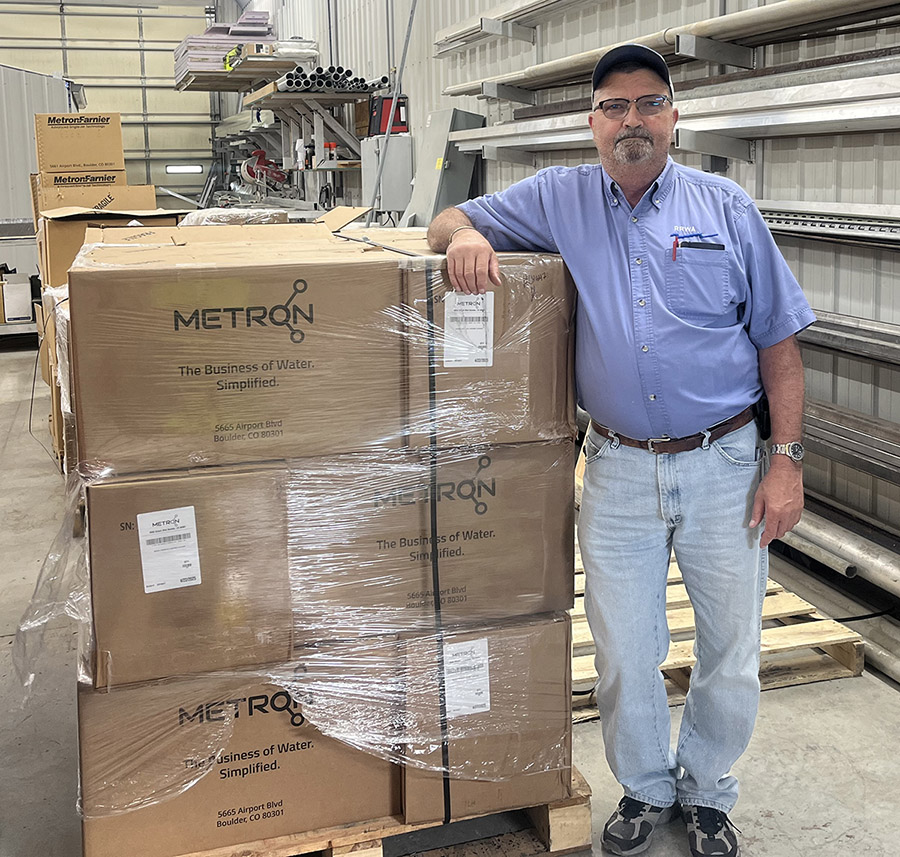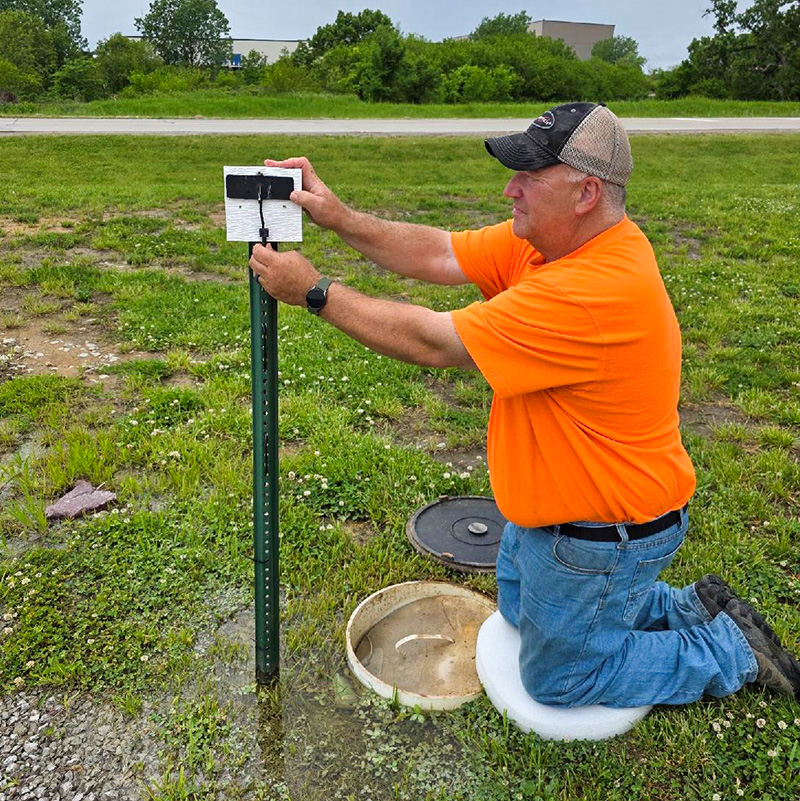
Photograph: RRWA
CASE STUDY
How Rathbun Regional Water Association Brought Smart Meters to Rural Iowa
Metron partnership has customers lining up to install cellular devices in remote areas.
Founded in 1972 by a coalition of Iowa farmers and community leaders, Rathbun Regional Water Association (RRWA) has grown to become Iowa’s largest rural water system, and one of the largest rural water utilities in the United States. Each day, RRWA delivers water to over 100,000 residents across 22 counties in Iowa and Missouri, and supports countless businesses, livestock operations, and industrial facilities throughout the Association’s service territory.
Despite RRWA’s investment of more than $40 million in infrastructure improvements over the past decade, most customers still read their own meters and mail in monthly checks to pay for their water use—an outdated practice for modern water utilities. Now, that’s changing: thanks to a partnership with Metron, RRWA is migrating to cellular smart meters that automatically transmit data to WaterScope®, which exports billing information to the organization’s billing department—with no need for customers to tramp outside in the cold to read their own meters.
“Previously, we had to wait for customers to take their meter read, fill out a ticket, and send us a check,” says RRWA chief executive officer Rod Glosser. “Now we can grab that data through cellular smart meters on the first of the month, send out a notification to the customers, and receive an auto-payment five days later. It’s all completely automated, and the customer doesn’t have to do a thing.”
So far, almost half of RRWA’s 23,000 connections have been upgraded to smart meters, and the RRWA team plans on installing even more in the coming months. “We’re huge fans of Metron,” says Marty Braster, RRWA’s support services officer. “We’re always talking them up to other rural water utilities—we have an outstanding relationship with them.”
Bringing connectivity to rural areas
Part of the challenge for RRWA is that many remote-read metering technologies aren’t designed for the unique needs of rural providers. Drive-by AMR metering, for instance, is impractical given the scale on which RRWA operates, with a service territory spanning more than 5,000 square miles. For the same reason, fixed-network AMR metering would not be feasible to implement, since it would require building expensive radio masts all over RRWA’s area of operations.
Cellular smart meters, on the other hand, don’t require drive-by trips or costly new infrastructure: they simply transmit data using existing commercial cellular networks. For RRWA, that finally made it possible to modernize its meters without breaking the bank. “We’d been waiting for the right technology, and cellular metering seems to be it,” Braster says.
Before finding Metron, RRWA experimented with cellular meters from another vendor, but things didn’t go to plan. “Their customer service was not responsive, and they didn’t tell us some important things up front,” explains Richard Brooke, RRWA’s wastewater superintendent and smart meter specialist. It was only after RRWA had installed around 1,000 meters that the utility discovered the vendor’s hardware was prone to shutting down in cold weather. “That was huge for us here in Southern Iowa—we had a bunch shut down in that first winter,” Brooke recalls. “We were like, ‘Well, this isn’t going to work.’”
The headaches continued, with the vendor’s 2G meters becoming obsolete as cellular providers updated their networks to more modern 4G and 5G technologies and turned off support for 2G. Around the same time, the RRWA team bumped into a Metron sales rep at the Iowa Rural Water Association conference. They were impressed by the meters they had on display—and by Metron’s warranty, which guarantees cellular connectivity for the life of the meter.
“We’d started reaching out to all the vendors that we knew had cellular enabled meters,” Glosser says. “We considered three or four other vendors, but Metron was the one that stood out above everyone else. That’s when we decided to run a pilot project with Metron.”
5 key benefits from Metron meters
Since partnering with Metron, leaders at RRWA say they’ve seen five big benefits from their cellular smart meters:
1. Easier billing—and enthusiastic customers
Close to 80% of RRWA’s customers with smart meters have signed up for auto-pay, enabling them to forget about getting meter readings and mailing in paper checks. In fact, Braster says, the ability to sign up for auto-pay is the single biggest reason why rural Iowans are requesting smart meters. “It’s been a big selling-point,” Brooke says. “All folks care about is getting their meter reading easily without having to go out in the snow.”
Onboarding new customers to smart meters can take a bit of hand-holding—some customers weren’t comfortable with the technology. “It’s been a learning experience for some of our customers, but that should lessen over time,” Braster says. “Auto-pay was something we just couldn’t offer before we switched to cellular smart meters. Now the vast majority of our customers have it available to them.”
2. Hardware you can depend on
With a warranty guaranteeing cellular connectivity over each meter’s operational lifespan, Metron’s devices have proven a hit with RRWA. Impressively, they even worked well in remote areas with weak cell coverage. “We bought some bigger antennas for 11 bucks off Amazon, and we’ve been able to put them in places where we thought we’d never get service,” Brooke says. “Right now, we are at 99.7% connection, which is pretty solid.”
The RRWA team was also impressed by Metron’s composite meter bodies, which have proven easily tough enough to withstand the harsh Iowa winters. In fact, the only issues have come when customers fail to take proper care of their meters. “The only times we’ve had issues are if someone takes the frost lid off, or lets their dog chew up the antenna,” Brooke explains. “We don’t have any complaints about the hardware we’re receiving.”
3. A company that puts customers first
After having a poor experience with their previous vendor, RRWA was impressed by Metron’s commitment to delivering great customer service over the full lifetime of its meters. “I mean, the product’s great. But the service is amazing,” Braster says. Flint Salladay, RRWA’s shop coordinator and inventory control specialist agrees: “The other vendor would take forever to call us back, but with Metron someone answers the phone and starts working on our issue right away.”
With a dedicated Metron rep handling their needs, the RRWA team knows exactly who to turn to with any questions or concerns. “We deal with our guy at Metron a lot, sometimes on weekly basis,” Brooke adds. “If I have a question, Metron gets us an answer—usually within a day. We’re a pretty tough customer, but Metron has never let us down.”
4. Accurate usage and billing
While most RRWA customers honestly reported their water usage, self-read meters can cause problems. Sometimes, the RRWA team would realize people were estimating their usage rather than taking direct and accurate readings. “After a customer’s meter reads 5,000 gallons per month for two years straight, they get tired of walking out to the meter, and just assume they know what it’s going to read,” Glosser explains. “But if that customer then gets a large leak, they might go months without noticing it.”
With smart meters, unusual usage can be spotted right away, ensuring that customers never get unpleasant surprises when their water bill is due.
5. Water intelligence for proactive leak prevention
Switching to smart meters has given RRWA important new insights into water usage, helping to pinpoint leaks and reduce waste across its system. “WaterScope lets us look at customers’ water usage and identify anything that seems out of line,” Braster explains. “We’ve saved some customers a significant amount of money by spotting leaks long before they would have found them,” Braster says.
In one small community where smart meters make up 80% of the system, RRWA was able to help residents dramatically reduce their water losses by identifying leaks and raising awareness, cutting the community’s total water losses to less than 10%. “As we continue to get a higher number of Metron meters installed, I think analytics will start playing a much bigger role for us,” Glosser says.

More growth on the horizon
As word has spread, customers have been lining up to get smart meters installed. So far, nearly half of RRWA customers have made the switch to Metron devices. “The waitlist hovers almost continually at the same level—any time you look, there seems to be a magic number of 150 people waiting for smart meters,” Braster says.
That allows RRWA to roll out meters in a steady cadence, using in-house field teams, rather than making a big up-front investment or contracting out for installation. “We just let the customers know the benefits, then allow them to request the meters if interested,” Braster explains. “It’s all driven by customer demand. We’ve had great success with Metron, and we’re rolling out smart meters at a pace that works for us.”

